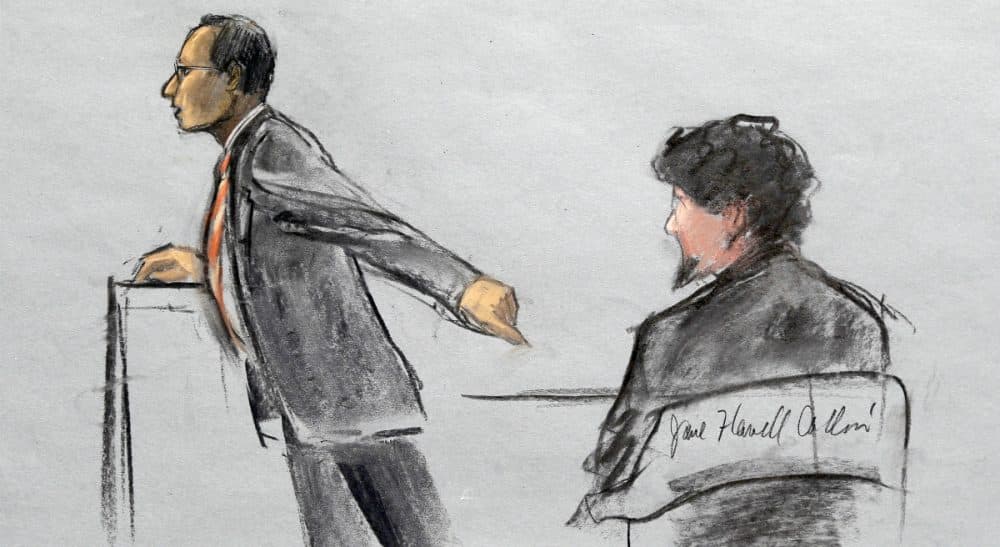Advertisement
After The Rhetoric, The True Cost Of Capital Punishment

Following political mantras to their logical conclusions on societal issues can sometimes reveal a mantra’s inherent lack of logic. For instance, if small-government conservatives would abide by the results of applying their “less government, less spending” mantra to capital punishment, not a one would support the practice.
The simple reason is that capital cases involve more government activity and more taxpayer dollars than non-capital cases. This has been confirmed in study after study. Capital cases require longer trial preparation times, extended jury selection phases, lengthier trials, an additional sentencing trial following a guilty verdict and an enormously expensive and time-consuming appeals process.
[Tough-on-crime death penalty supporters] showcase their vitriol on high profile capital cases like Tsarnaev’s while flying blind to the stifling systemic realities of capital punishment.
Advancing a data-based anti-death penalty argument amid a trial as emotionally wrenching as Dzhokhar Tsarnaev’s can make one appear unsympathetic to victims. But there’s a compelling case to be made that such an argument displays greater compassion for victims than the unnuanced absolutism of the loudest death-penalty proponents. An anti-death penalty caller to a typical talk radio show is inevitably thrashed as a soft-headed coddler of murderers. Lost in the hosts’ bombast is the impact of capital cases on current and future crime victims.
In a contest of death penalty aphorisms, “an eye for an eye” should be countered with “justice delayed is justice denied.” Outsized government expenditures paired with courtroom-hogging trials and appellate hearings slow the wheels of justice. Victims of crimes that don’t get much attention — simple assaults, burglaries, identity theft — deal with prosecutor’s offices overburdened by death penalty appellate expenses and court dockets clogged by death penalty motions. Cases move slower. Justice gets delayed.
This reality upends the arguments of tough-on-crime death penalty supporters. They showcase their vitriol on high profile capital cases like Tsarnaev’s while flying blind to the stifling systemic realities of capital punishment.
Even law enforcement officials in leading death penalty states have questioned the cost of the measure. “I know now that if I file a capital murder case and don't seek the death penalty, the expense is much less,” James Farren, the district attorney of Randall County in the Texas panhandle, told the Marshall Project last December. “While I know that justice is not for sale, if I bankrupt the county, and we simply don't have any money, and the next day someone goes into a daycare and guns down five kids, what do I say? Sorry?” In Jasper County, Texas, near the Louisiana border, the trials of three men who dragged an African-American man to death behind their pickup truck in 1998 cost taxpayers $731,000, which doesn’t include continued appeals for one of the defendants (another was executed in 2011; the third received life in prison). The tax rate increase for the county was 8 percent in the trial years, compared to the usual 5 percent.
It’s ironic that officeholders who sign oaths against tax hikes and attack food stamp and other aid programs voice such ardent support for a system with such onerous financial and organizational outcomes. Ironic, but not surprising.
It’s ironic that officeholders who sign oaths against tax hikes and attack food stamp and other aid programs voice such ardent support for a system with such onerous financial and organizational outcomes. Ironic, but not surprising. Trumpeting the ultimate penalty against repellent individuals scores easy points, especially when the ripple effect on other victims and the justice system itself goes unnoticed.
Whether Tsarnaev, or the Texas white supremacists who dragged James Byrd Jr. to death, or any other killers deserve to die is only half the question. Decoupling this emotive half of the debate from its prosaic flipside — namely, the costs and systemic impacts of capital punishment — is intellectually assailable. Society should demand a braver reckoning from its leaders and itself.
